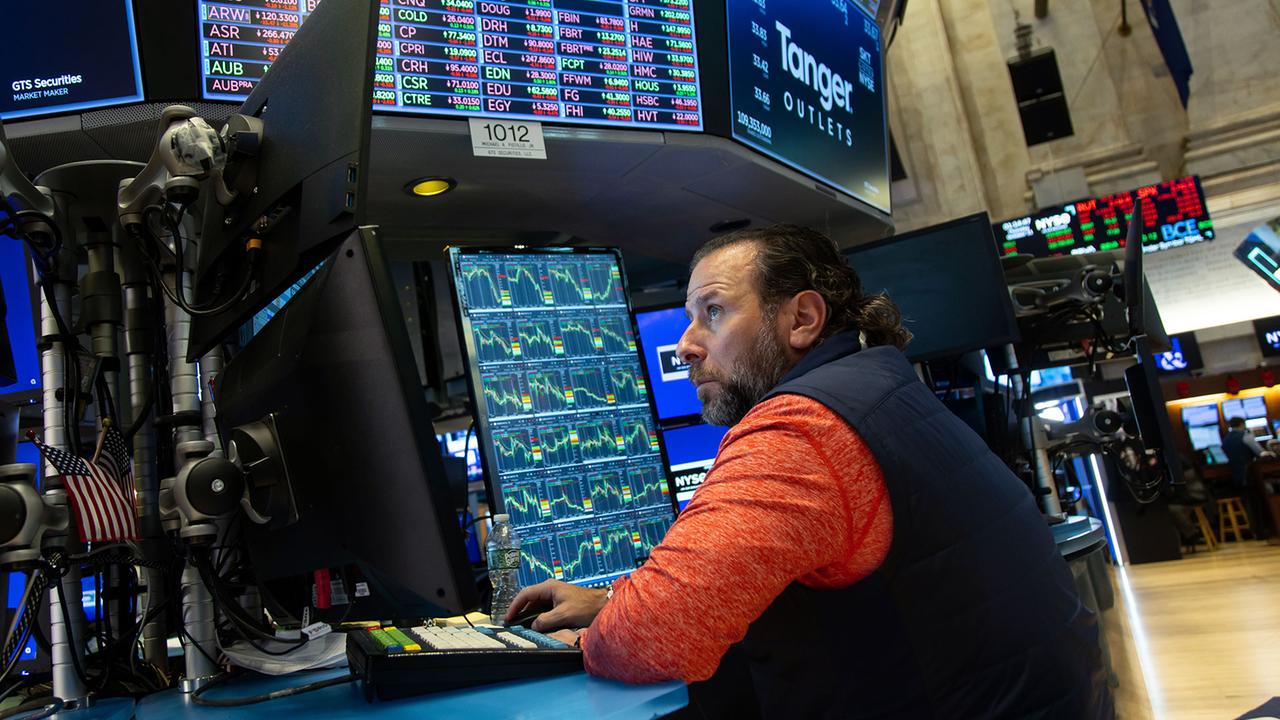market report
On the day of the US election, investors demonstrated confidence despite the uncertain outcome. Nevertheless, investors are bracing themselves for fluctuating prices in the next few days until a clear winner is determined.
On the day of the US presidential election, investors on the New York stock exchanges shed their recent risk aversion. “Election Day strength is nothing new,” commented Carson chief strategist Ryan Detrick. “The fundamentals of the economy are pretty good.”
The main driver here today was the technology sector. The technology-heavy Nasdaq advanced 1.4 percent to 18,439.17 points, particularly supported by Nvidia. The AI specialist's titles gained up to 3.6 percent, meaning Nvidia once again overtook iPhone manufacturer Apple as the world's most valuable company in terms of stock market valuation. The other indices also rose significantly: the US standard value index gained 1.0 percent to 42,221 points and the broad S&P 500 gained 1.2 percent to 5,782.76 points.
However, the market could become significantly more volatile in the next few days: The VIX index for the volatility of US stocks, known as Wall Street's fear barometer, was at 20.24. This was well above September's figure of 15, but was only half the level seen at the last election in 2020. This is seen as a sign that markets remained relatively confident.
After a bitter election campaign between Donald Trump and Kamala Harris, it remains a neck-and-neck race between the two candidates: in the fight for political power in the world's largest economy, the Democrat Kamala Harris and the Republican Donald Trump are almost neck and neck, according to the latest polls . A decision on the outcome of the election could therefore take a long time.
What would an optimal election result for the stock market look like? “Due to his more business-friendly policies, Donald Trump is Wall Street's favorite. But fundamentally, the stock markets prefer an outcome with a divided Congress,” says Index Radar's commentary. “Apart from decrees, the president cannot govern in such an environment and compromises have to be found,” say the experts.
Robert Halver, market analyst at Baader Bank, also sees Trump as the stock market's favorite: “His economic agenda of deregulation, tax relief and increased protectionism while continuing lively debt mania to promote national economic development is well received on the stock market,” explains Halver.
In the final spurt of the race for the White House, investors are now increasingly betting on a victory for former President Trump. Shares in Trump Media & Technology Group rose as much as 11.5 percent in the first minutes of trading. And cryptocurrencies are also recording price gains: market leader Bitcoin climbs more than four percent to just under the 70,000 mark, and Ether also increases by more than four percent. Cryptocurrencies are considered so-called “Trump trades” – investments with which investors bet on a victory by Republican Donald Trump in the US presidential election.
The US election is being followed with excitement – it was also the dominant topic on the German stock market today. At first, the DAX meandered between slight gains and losses, but then caught itself: In late trading, the leading German index reached its daily high and closed just below it with an increase of 0.57 percent at 19,256 points.
“The professional players on the financial markets are prepared for a roller coaster ride across all asset classes when the votes for the US presidential election are gradually counted from midnight in our time,” stated analyst Konstantin Oldenburger from CMC Markets. And that is likely to drag on for days, writes Christian Subbe, Chief Investment Officer of HQ Trust. “We expect increased volatility on the markets in the coming days. After all, it is not clear when the election will finally be counted. This could take weeks.”
The euro hardly moved against the US dollar; the common currency last cost 1.0906 dollars. No major price movements are expected on the foreign exchange market as the day progresses.
The Audi Group made significantly less profit in the third quarter of this year than in the previous year. The operating result was 106 million euros, 91 percent below the previous year's figure. Audi spoke of a “challenging overall economic situation” and high costs as a result of the factory closure in Brussels at the end of February 2025. The VW subsidiary's sales reached around 15 billion euros, which is 5.5 percent less than in the previous year.
Electric cars continue to have a difficult time in Germany. Almost 35,500 battery-electric cars hit the roads in October, as the Federal Motor Transport Authority (KBA) announced, around five percent fewer than in the same month last year. However, demand for so-called plug-in hybrids, which have both an electric and a combustion engine drive, increased significantly. More than 19,300 hybrid vehicles were newly registered in October, around 18 percent more than in the same month last year.
According to an insider, a dispute has broken out between the Italian government and Lufthansa about joining the Italian state airline ITA Airways. The Italian Finance Ministry put the deal on hold because Lufthansa wanted to pay less than agreed for the 41 percent stake, a person familiar with the matter told the Reuters news agency. Accordingly, Lufthansa argues that it wants to pay less than the agreed 603 million euros because the airline's valuation is now lower than it was six months ago.
Frankfurt Airport is still not getting going after the Corona crisis. The operator Fraport expects just over 61 million passengers this year – compared to the record year 2019, this means an expected backlog of almost 10 million flights. Fraport boss Stefan Schulte cites the high state-imposed fees and taxes for air traffic in Germany as the main reason for the lull.
The technology group Jenoptik no longer expects to achieve its goals for 2025. Sales of 1.2 billion euros and an Ebitda margin (earnings before interest, taxes, depreciation and amortization) of 21 to 22 percent would probably only be achieved a year later. the company said. As justification, Jenoptik referred to the company's expected delay in the upswing in the semiconductor equipment industry. However, the group confirmed its targets for 2024 due to the continued good order backlog.
The streaming giant Netflix's headquarters in Paris and Amsterdam were searched because of tax allegations. Financial investigators and anti-corruption investigators took a close look at the company headquarters in France and the European headquarters, as the dpa learned. It's about the suspicion of concealing tax fraud and undeclared work. The preliminary investigations against the video streaming market leader have been ongoing since November 2022.
The insolvent air taxi developer Lilium is looking for an investor with the help of the advisor KPMG. The first discussions will begin shortly. The Weilheim district court approved the insolvency application and the application for self-administration. The lawyers Gerrit Hölzle and Thorsten Bieg were appointed to the management board, and Ivo-Meinert Willrodt was appointed as provisional administrator, according to the company. Trading in Lilium shares on the Nasdaq will be suspended from November 6th, after which the securities can be traded over the counter.
Salzgitter's shareholders are facing a takeover offer. The second largest shareholder GP Günter Papenburg AG is considering a corresponding offer together with TSR Recycling GmbH & Co. KG, the steel manufacturer announced. The possible offer would be subject to the condition that the consortium receives at least 45 percent plus one share.
The Lower Saxony state government has brought the possible takeover of the steel company into consideration. The Lower Saxony Ministry of Finance announced that it is examining the intended takeover and the associated legal and economic consequences very carefully.
The world's largest oil producer Saudi Aramco is feeling the effects of lower crude oil prices and weaker refining margins. In the third quarter, net profit fell by a good 15 percent to $27.6 billion. Despite the drop in profits, Aramco plans to pay out $31.1 billion in dividends for the quarter. In total, the group has promised distributions of $124.3 billion this year. The Saudi government, which directly owns nearly 81.5 percent of Aramco, relies heavily on this revenue, which also includes royalties and taxes.
DHL recorded a sales increase of 6.2 percent to 20.6 billion euros in the third quarter. The profit after third-party shares was 751 million euros. A year ago it was 807 million euros. Operating income (EBIT) stagnated at around 1.3 billion euros.
At the dialysis specialist Fresenius Medical Care (FMC), the corporate restructuring continues to bear fruit. In the third quarter, thanks to savings, the operating result rose surprisingly sharply by 43 percent to 463 million euros. Adjusted for special effects and at constant exchange rates, the increase was ten percent compared to the previous year. However, revenue fell by four percent to 4.76 billion euros; adjusted and excluding exchange rate effects, it was still minus one percent.
The US chemical company Dow is putting some locations in Germany and Europe to the test. According to a company spokeswoman, this primarily affects systems in the polyurethane business (PU plastic). Around 3,600 employees work at 13 locations in Germany.




